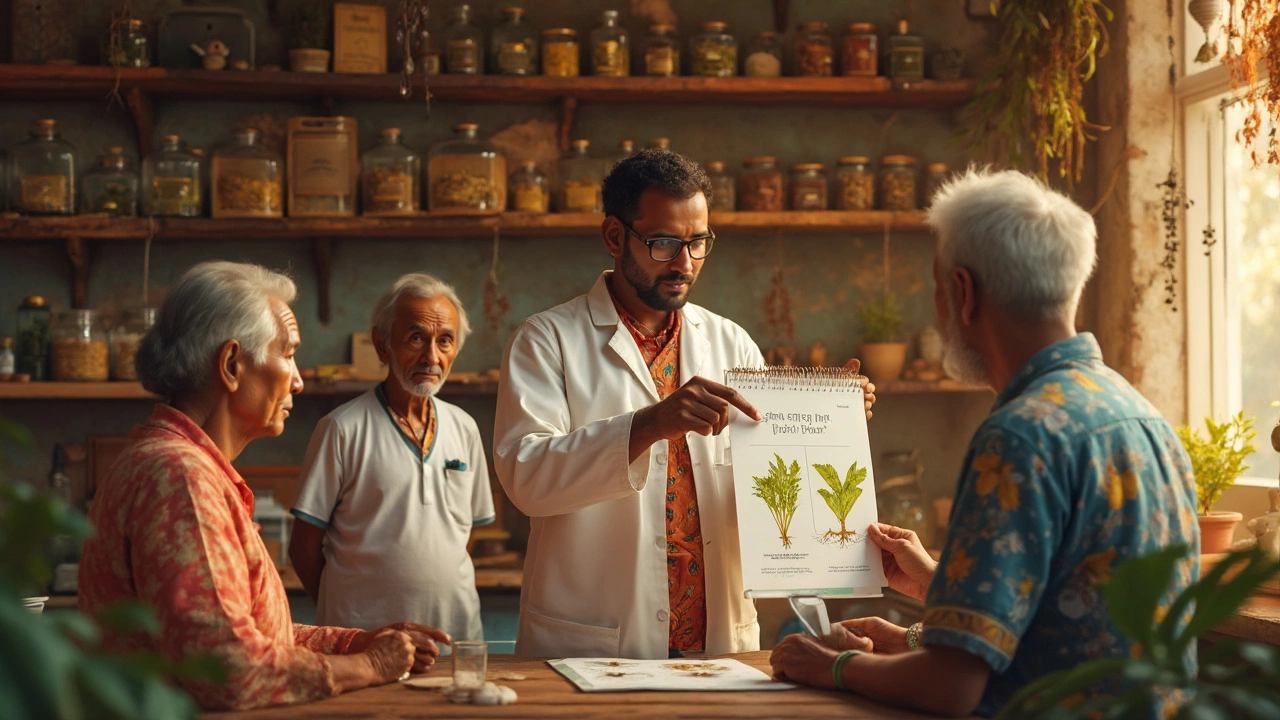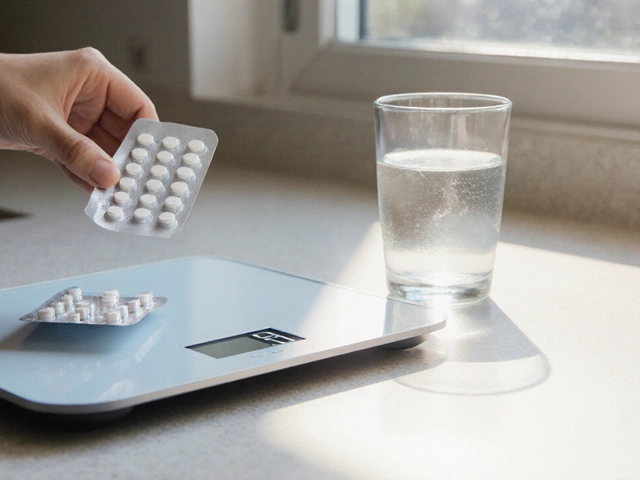Did you know that your morning cup of tea, homemade herbal concoctions, or those trendy supplements you picked up can actually put your liver at risk? Some herbs, praised on all sides for their healing power, can quietly trigger serious liver damage. There’s no red flag when you pop a capsule or sip a herbal brew – the effects often sneak up slowly. Your liver, which filters everything from toxins to medicines, usually keeps its cool, but push it too hard with just the wrong stuff, and trouble brews. Even right here in Pune, where Ayurveda is practically a household word and herbal teas are a daily habit, the risk isn’t as far-off as you might think. People assume “natural” means “safe.” Spoiler: That’s not always true.
Herbs And Supplements That Can Damage Your Liver: What’s On The Watchlist?
First, let’s clear something up. Not every plant in your grandma’s garden is a villain. But yes, several herbal products sold in shops and online, even the ones with shiny '100% natural' labels, are secretly toxic to the liver. One of the most notorious is kava, a plant root used to calm nerves and help with sleep. Studies from places like Fiji, where kava is traditional, have linked regular kava use to severe liver injury, and countries including Germany and Canada have restricted or banned it. Yet, kava is still easy to find in supplement shops in many countries.
Then there’s comfrey. The pretty purple-flowered herb is famous for soothing muscle aches, but enough comfrey tea or ointment can destroy sections of liver tissue. Why? Comfrey contains pyrrolizidine alkaloids—this chemical group blocks blood flow in tiny liver vessels, leading to serious, sometimes fatal, damage. Nearly every health authority—including the US FDA—has issued warnings about internal use. Some home remedies still sneak past, though.
Borage, another plant sometimes swapped into salads or herbal capsules for “hormonal balance,” brings the same kind of liver drama. Borage also packs pyrrolizidines, which are even riskier for kids and pregnant women. Regular use can mean slow, silent poisoning.
Green tea extract surprised a lot of fans. Although sipping tea the traditional way is quite safe (actually, it may help your liver)—big doses of green tea extract in weight-loss pills can trigger severe hepatitis and even liver failure. Experts think it’s the concentrated catechins that overwhelm the liver’s job, especially in people with a genetic risk. Check your supplement labels – concentrated extracts aren’t the same as a mug of chai.
Neem, holy basil, and giloy are India’s herbal trio, each with plenty of benefits when used traditionally. But case reports in big Indian hospitals reveal that giloy-based immune formulas have occasionally led to acute liver injury, especially when mixed with other risky herbs or at high doses. Doctors at Apollo Hospitals Hyderabad actually published a paper in 2021 on unexpected giloy liver injuries during the COVID pandemic, when everybody was gulping down immunity boosters.
Chaparral, a shrub from the American Southwest, once rode a wave of popularity as a “blood purifier.” By the late 1990s, so many Americans were showing up with jaundice and liver failure that chaparral warnings went out across the world. The plant was long used by Native communities, but as a daily supplement, it’s dangerous.
Feeling safe with Ayurvedic blends? While most are prepared safely, some imported, unregulated mixtures have been caught with hidden toxins (arsenic, lead) or tough-to-pronounce herbs with unstudied side effects. Caution: the words “ancient Indian formula” aren’t a medical guarantee.
Don’t forget traditional Chinese medicine, either. He shou wu (also called fo-ti) is a root used for hair growth, anti-aging, and vitality. But there’s a catch: dozens of liver injury cases from the US, Hong Kong, and India have been traced back to fo-ti supplements. The suspected culprit is another tricky plant compound that can inflame the liver or trigger immune attacks on liver cells.
Here’s a quick roundup of herbs linked with liver harm, according to medical case reports and health authorities:
- Toxic herbs: Kava (Piper methysticum), comfrey (Symphytum officinale), chaparral (Larrea tridentata), borage (Borago officinalis), green tea extract (Epigallocatechin gallate - only in high doses), pennyroyal, germander, valerian (in rare overdoses), and He shou wu (Polygonum multiflorum).
- Giloy (Tinospora cordifolia)—with warnings for some cases in India.
- Centella asiatica (gotu kola)—sometimes linked with hepatitis after extended high dosing.
- Senna—popular for constipation, but when abused or used long-term can irritate and hurt the liver.
Paying attention yet? Quite a few herbs are just fine in small, food-like doses but can do real harm as concentrated extracts or in mega-doses for 'detox' or weight loss. Your body isn’t built for swallowing sprouts at twenty times the natural level every day.

Why Herbal Products Can Harm the Liver: The Science Behind the Problem
The liver is a champ at multitasking: it cleans your blood, breaks down toxins, stores vitamins, and helps your gut digest nutrients. It’s usually a silent worker—you won’t feel it shouting until something’s gone seriously wrong. When you take a drug or herbal supplement, it enters the bloodstream and gets shipped to the liver for processing. This is where the problem starts.
Some herbs contain plant alkaloids and polyphenols which stress liver enzymes. Imagine the liver as a customs office; most substances pass smoothly after going through checks. But the toxic chemicals in certain herbs block or jam up this process. Pyrrolizidine alkaloids, found in comfrey and borage, get converted into compounds that shred liver cells. With chronic exposure, this can lead to veno-occlusive disease—small blood vessels in your liver become blocked, and the result is life-threatening liver failure.
Kava’s attack is different. It damages liver cells directly, possibly through mitochondrial poisoning—basically, the “energy generators” of cells are disrupted and poisoned. This leads to sudden, silent breakdown of liver tissue. A few unlucky people have gone from healthy to acute hepatitis in weeks after starting kava supplements.
Green tea extract-related liver injury is usually a dose thing. Your liver struggles to metabolize high levels of catechins (the powerful antioxidants in green tea), and byproducts pile up. For certain folks with genetic quirks, these byproducts blast apart liver cells, causing hepatitis-like inflammation.
Chaparral contains nordihydroguaiaretic acid, a natural antioxidant – sounds healthy, right? But in the human liver, this chemical gets transformed into toxic metabolites that build up until the liver cells collapse under pressure—a perfect example of good intentions gone wrong.
There’s also the issue of contamination. A 2022 survey of popular herbal supplements in India found that around 15% of them contained heavy metals like arsenic and lead–never listed on the label. These hidden toxins put extra stress on the liver, already busy with daily life and regular meds you might take.
The way you use herbs matters, too. If you drink occasional tulsi tea, no problem. But chugging concentrated, unregulated herbal tinctures daily can overload your liver’s capacity to detoxify and heal itself. This is even more true if you use different herbs together, or if you already have a liver condition (fatty liver, hepatitis, cirrhosis), or drink alcohol.
Surprisingly, even living healthy with tons of herbal teas and supplements can mean trouble if your genes don’t process certain plant compounds efficiently. Some people have faulty liver enzymes (like the CYP450 system) and can’t clear toxins quickly. That’s why one person handles a supplement fine, while another ends up in the hospital.
There’s no good way to “flush out” damage once it happens. Liver injury symptoms are sneaky: you might notice fatigue, mild abdominal pain, itchy skin, or dark urine weeks after starting a supplement. Sometimes, the first clue is yellowing eyes (jaundice)—by then, the damage could be serious. Even blood tests might not spot it until a lot of harm has happened.
Doctors notice a pattern when people arrive with unexplained liver problems: about 15-20% have used some herbal supplement recently. Reports from India, the US, China, and Europe all say the same thing—herbals aren’t rare causes of liver injury. And the trend is growing, thanks to more supplement usage worldwide.
As much as herbalists and well-meaning relatives swear by their favorite home remedy, you can't always count on centuries-old wisdom. Nothing is one-size-fits-all with herbs—especially doses in capsules, which can be 50-100 times what our ancestors used when making tea or seasoning food.

Tips to Use Herbal Supplements Safely: Don’t Gamble With Your Liver
Worried about what’s in your supplement bottle, or how to keep your liver safe while still enjoying traditional remedies? Good call—you don’t have to turn your back on Ayurveda or herbal medicine, but you need to be smart. Here’s what wise herbal lovers do:
- Stick to food-like doses. Using mint in your chutney, coriander in your curry, or tulsi in a daily chai is generally safe. It’s the concentrated extracts and mystery herbal blends that pack hidden risks.
- Avoid the big players on the danger list—especially kava, comfrey, pennyroyal, chaparral, and unregulated green tea extracts. If a product lists any of these prominently, think twice.
- Get supplements from trusted sources only. Look for goods approved by regulatory authorities with batch-testing for heavy metals and toxins. Don’t buy shady powders from unknown Instagram sellers or dodgy markets.
- Be wary of 'detox' or rapid weight-loss pills. Many of these contain unsafe herbs or high-dose extracts. There’s no shortcut: liver cleansing doesn’t work by flooding your system with strange compounds.
- If you’re on medication or have any chronic health issue—especially hepatitis, fatty liver, diabetes, or kidney disease—talk to your doctor before starting any new herbal supplement. Herbs can interact with prescription drugs in unpredictable ways.
- Pregnant, breastfeeding, and children should be extra cautious. Kids’ livers are more vulnerable because they’re still developing. Never use herbal remedies for kids unless guided by a specialist.
- Watch for symptoms. If you feel unexplained fatigue, yellow skin or eyes, severe itchiness, nausea, or dark urine days or weeks after starting an herbal, stop immediately and see a doctor.
- Less is more. Your body is resilient but not invincible. Use one herbal product at a time, and avoid mixing lots of different powders, teas, or “immune boosters.”
- Traditional doesn’t mean risk-free. Just because an herb is handed down through the generations doesn’t make it harmless, especially in super-charged modern doses.
- Liver health should always come before quick fixes. It’s tempting to think a pill can replace sleep, a balanced diet, or real treatment, but the liver pays the price for shortcuts.
Last tip: Don’t take advice on herbal remedies solely from social media, WhatsApp forwards, or anyone selling you a miracle cure. There’s a gap between promise and reality. Better to check facts and stay safe—your liver works 24/7, and you get only one.





